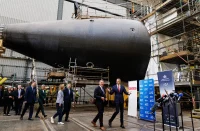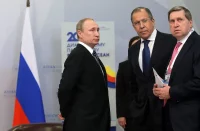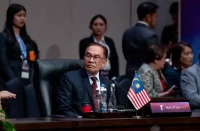President Asif Ali Zardari made history. His three-day official visit to the Russian Federation on 12-14 May, first after 1974 from Pakistan side, is an important step toward re-directing the contours of Pakistan’s foreign policy that is now more enmeshed with resource diplomacy such as energy needs. Pakistan is just laying next-door neighbor to a powerful and the world’s largest country – Russia. The country is full of natural resources and Pakistan’s growing population and increasing industrial demands, Russia could play a crucial role.
It is worth mentioning that in the last 37 years, President Zardari is the first Pakistani leader, who made an official visit to Russia after Prime Minister Zulfikar Ali Bhutto paid an official visit to the then Soviet Union in 1974. The diplomatic gap has remained immense between the two countries. Many twists occurred depending on international politics. Prime Minister Liaquat Ali Khan missed the opportunity by not visiting the Soviet Union while the invitation was extended to him on 22 June 1949 much earlier than the Americans extended a similar invitation to him. He preferred to visit the United States first. The action, nevertheless, disgraced and strained our relations with the Soviet Union.
Prime Minister Bhutto made a deliberate attempt to warm relations with Russia as he was trying to improve relations with the Communist bloc. Hitherto, relations with the Communist bloc remained strained. The U-2 incident, the Indo-Soviet treaty of 1970, and Pakistan support to the West against Russia severely destroyed their relations. Unfortunately, the gap deepened once again after Bhutto’s ousting. Things started improving since the 1990s and much more momentum was built after Pakistan withdrew support from the Taliban in Afghanistan. Today the ground is much fertile than any time in the past to warm the relations.
President Zardari now attempted to fill the gap. It successful moving the ties with Russia should be considered another feather in President Zardari’s cap. He put the Pak-Russo relations on a broad and a solid footing in line with Bhutto’s foreign policy of balancing ties with all important players. In this policy Russia matters a lot. Intelligentsia in Pakistan lauded and accounted President Zardari visit to Russia as somewhat timely, logical, and intelligent move. In the post-Osama era, Beijing and Russia, and others, do greatly acknowledged the important role Islamabad and especially its military has played in the war against terrorism. The visit of Presuident Zardari to Russia and also the visit of Prime Minister Yousuf Raza Gilani to Beijing on 17-20 May should be seen against these contexts.
While public and media normally criticize high-level visits as they give loss to the national exchequer, the visit of President Zardari to Russia was much appreciated as it introduced a fundamental shift and a new opportunity in Pakistan foreign relations especially after the Parliament debated to review the country’s relations with the United States. Many believe that the United States has become a security risk for Pakistan following the Osama episode on 2 May at Abbottabad. Although scheduled before, many analysts viewed this visit from these perspectives too.
The strategic contours of ties between Pakistan and Russia are highly reciprocal and fill each other’s needs. Pakistan needs energy and technology, while Russia inspires for a land route to have an access to the warm-water ports in the Arabian Sea. Pakistan is best suited to meet this demand that in turn could also open up new opportunities for the landlocked Central Asian Republics, While offering a strategic gift to Russia, soon after his arrival at Kremlin, President Zardari announced to provide southern warm-water access to Russia to build a new strategic and highly promising economic and diplomatic ties between the two countries in the coming days.
Both countries agreed to continue to enhance contacts, consultations, cooperation, and coordination in the broader region through bilateral and translateral arrangements. Time is approaching fast when Pakistan would become a full member of the Shanhai Cooperation Organization (SCO), a Sino-Russian regional forum to promote tie at multiple levels. They fully endorsed the importance of security in Afghanistan to promote stability in the region by supporting the Afghan-led efforts and anti-narco drive to achieve that end. The convergence of their views on the situation inside Afghanistan is a positive step toward efforts in bringing peace in the war-ravaged country now occupied by US and NATO forces. Zardari and the President of the Russian Federation Dmitry Medvedev reiterated the importance the two countries to the quadrilateral process (Russian Federation, Pakistan, Tajikistan and Afghanistan) in the broader region.
Pakistan Peoples Party has a vision of strategically developing relations with Pakistan’s joint neighbors, China and Russia. The country has been successful on China but could not develop warm relations with Russia – a balance that was neglected and largely tilted toward China and US-led Western allies for one or other reasons. The long-over due visit of President Zardari would help reduce this imbalance and create a new opportunity of ties between the two countries.
Earlier relations between Pakistan and the former Soviet Union were marred by tremendous differences and Pakistan’s own choices to go by the West. The army, establishment, and religious oriented elites obstructed relations. They wished a close relationship with the West that was faulty based on their politico-religious doctrines. The Afghan War injected immense rationale to that and fully armed them to obstruct into any possibility of the growth of essential ties between the former Soviet Union and later with Russia and Pakistan. After 9/11 and now in the post Osama era, non-pro-Western elements gained impetus to push their views. One should also look at this visit from this point of view.
US and Western-oriented relations have not paid enough to Pakistan. Public criticism and resentment is huge in Pakistan about its unnecessary tilt toward these allies. The visit of President Zardari should be seen against this changing context to help meet the growing energy needs of Pakistan. Now energy would re-direct Pakistan’s foreign policy in favor of Russia and the energy-powerful Central Asian Republics.
The potential of relations is immense between the two countries. For the last several years, many agreements to promote relations have been put aside in the cold storage without any sensible reason but with the tremendous efforts of Mr Sikander Ahmed Rai, Executive Director-General of the Board of Investment at Islamabad, several MoUs and agreements to promote economic and commercial ties in the fields of energy, infrastructure development, metal industry and agriculture were given a practical shape for execution.
Moreover, education, science and technology, air space, health, and marine sciences are going to be signed with Russian counterparts. Gas, oil, autos (such as Samara and Nova auto companies), and tractors (such as Chelyabinsk and Traktorexport companies) are other fields where both countries could enhance investment. Therefore, the relations have now been put on a much stronger footing and there would be a ‘steel-like’ sea change in both countries’ bilateral ties.
With the pro-active efforts of the Board of Investment, new vistas of cooperation between the two countries could be promoted. Many of Pakistani mega projects such as Steel Mill and Taxila Heavy Complex are either Russian or Chinese assisted projects, remarked by Rai while highlighting the significance of Pakistan ties with the non-Western partners. Russia could play a leading role in upgrading the Steel Mill. Potential Russian investment could be great in Pakistan covering all areas from huge industry to the service sector. The building of the Fergana-Dushambe-Gwader and Karachi railway could alter the ground realities and could change the entire regional geography. In the post-Osama era, such changes look eminent. This appears somewhat the first dent and a practical review in Pakistan foreign relations after the secret and unilateral US action in Abbottabad.
The building of the industrial infrastructure would likely to alter the economic landscape of the region. Both Pakistan and Russia expressed interest in the implementation of projects related to the creation of a system to transmit electric power and to the building of a gas pipeline between Turkmenistan-Afghanistan-Pakistan-India (TAPI).
Both Presidents reiterated the importance the two countries attach to the quadrilateral process (Russian Federation, Pakistan, Tajikistan and Afghanistan) and reaffirmed their commitment to further interaction in this format in close cooperation with the SCO. The Russian state-owned enterprise Tyazhprome export will take part in the modernization of Pakistan Steel Mills in Karachi, while the Inter Raoues will contribute to the building of energy generating facilities and Gazprom Zarubezhneftegaz to the development of gas fields in Pakistan besides other investment and baking sector.
In short, Pakistan diplomatic, political, and economic ties with Russia have been entering into new heights and a promising and mutually beneficial era that would balance country’s ties in the years ahead. The change is considered a welcome and a defining moment in our foreign policy. Hope the establishment would also welcome this peoples-led change that was intended to help not only to the remove the imbalance in our foreign policy that was long over due but also to help change the economic geography for gaining national prosperity and peace.
The writer is an Islamabad-based expert on Japan and international political economy.
Source: New Eastern Outlook














Pingback: Russia, Pakistan and Opportunities for Regional Cooperation « Stop NATO
Pingback: TOWARDS A RUSSIA-PAKISTAN “RELATIONSHIP”? IN DEFIANCE OF WASHINGTON « sreaves32
Pingback: Verso una “relazione” Russia-Pakistan in sfida a Washington « Aurora
Pingback: Verso una “relazione” Russia-Pakistan in sfida a Washington | STAMPA LIBERA
Pingback: Verso una “relazione” Russia-Pakistan in sfida a Washington - Brucialanotizia.it
Pingback: Russian-Belarusian Relations: ‘The Moment Of Truth’ Has Arrived – OrientalReview.org – DE LA GRANDE VADROUILLE A LA LONGUE MARGE